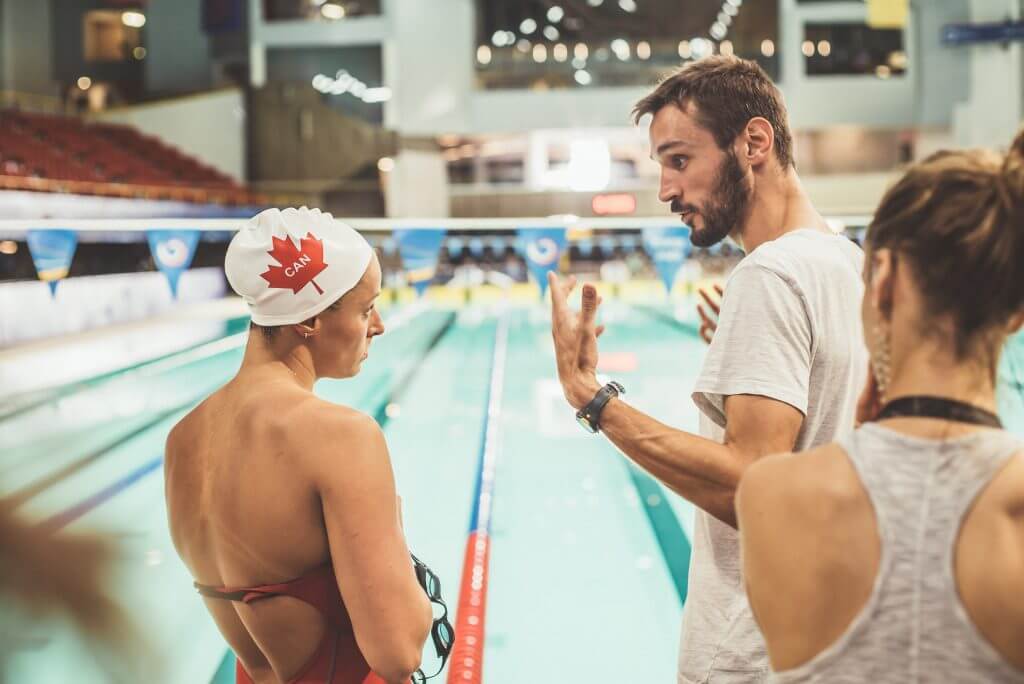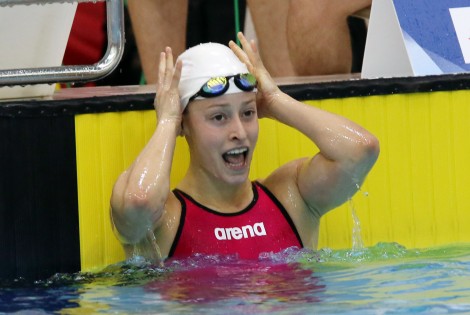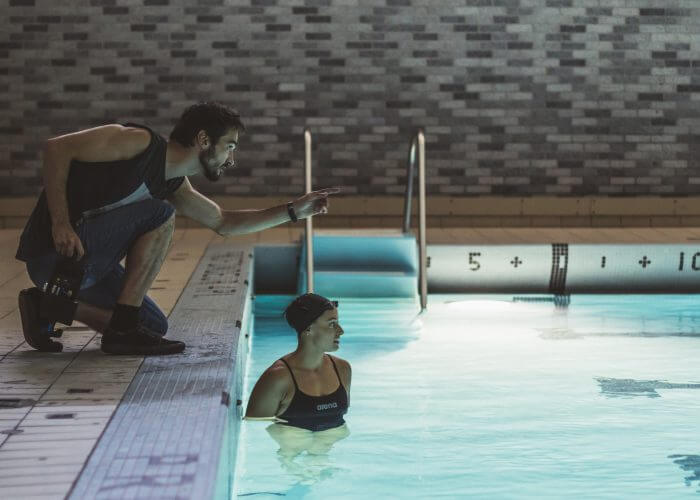In ‘Nadia, Butterfly,’ Pascal Plante Gives Swimming the Hollywood Treatment

When Pascal Plante went searching for his next filmmaking project, he let two central pillars of his identity converge.
Once, long ago (in Plante’s mind, though only a couple of Olympic cycles ago in reality), Plante was a swimmer, earning a spot at the Canadian Olympic Trials for the 2008 Beijing Games. But as he reflected on his experience in the pool, the complicated and nuanced journey that he and many peers had traveled, he didn’t see anything close to that represented in film.
So, he resolved, he’d just have to make that film.
“The main idea was that swimming narrative fiction has never been done right,” Plante told Swimming World. “It’s the film that I was missing, the film that the filmmaker in myself and the former athlete in myself both wanted to see.”
The result of Plante’s labors is Nadia, Butterfly, a feature film he wrote and directed. It stars Canadian swimmers Katerine Savard, Ariane Mainville and Hilary Caldwell, all first-time actors. The film didn’t just scratch an itch for Plante but has resonated with others, earning selection to the hallowed Cannes Film Festival, something Plante calls “the holy grail” for filmmakers.
The roots of the film’s, and Plante’s, success all trace back to the pool.
From the pool to the set
Nadia, Butterfly teases out the challenges of being an elite athlete, both in and out of the pool. How do you define success, in a sport where you measure yourself not just against your opponents but against your past selves? How do you cope with the sacrifice it takes? And what happens when those years of striving end and you have to redefine yourself outside of the pool, away from the friends and networks and toil that has given you purpose for years or decades?
The conceit for Plante in depicting that struggle is that it’s so far from what he experienced when his swimming career ended. The Quebec City native swam for Université Laval (UL), reaching the national trials level. But at age 19, he decided he was done with the sport. Part of the calculation was his desire to study film at Concordia University in Montreal, which doesn’t a swim team but does have the Mel Hoppenheim School of Cinema.
Contrary to what he would explore on film, Plante found his transition to be fairly seamless. Instead of hours in the pool, he devoted himself to hours studying film, both the kind of passions that aren’t served by being only halfway in.
“For me, retirement was easy,” Plante said. “And I know why. I think it was just because I moved from one passion, swimming, to another passion. I always was kind of the artist among the swimmers and I’ve always been a cinephile so I just transferred that energy that I had in the pool to the next chapter in my life.”
Plante, 31, has worked on several dozen films as a sound mixer and an editor. He wrote and directed his first short film, La Fleur de L’Age, in 2011. His first written and directed feature-length film, 2017’s Fake Tattoos, was shown at the Vancouver International Film Festival and received critical praise. Nadia, Butterfly is his second feature-length film.
‘You cannot fake it’
The first thing that Plante’s swimming experience told him about approaching a sports movie was simple: It’s got to be real.
“It’s a sport that you cannot fake visually,” he said. “If you’re not swimming butterfly at an international level, you cannot fake it.”

Katerine Savard Photo Courtesy: Swimming Canada
That revelation informed his casting decisions. Plante likes working with first-time or non-actors in general, so it wasn’t a departure to use Savard for the titular role. The 27-year-old represented Canada at the 2012 and 2016 Olympics. A Pont-Rouge native, she won a bronze medal in Rio in the 800 free relay, among a slew of medals at international and continental competition. She took five months off from the sport in 2018, but she’s back in the water competing for a spot in Tokyo next summer.
Caldwell, also a two-time Olympian, earned bronze in the 200 backstroke in Rio before retiring in 2018. Mainville, who swam at the junior international level, is the younger sister of Sandrine Mainville, who won bronze on the Canadian medley relay in Rio.
Savard started as a script consultant for Nadia, Butterfly. But as they progressed through the filmmaking process, Plante auditioned her and eventually gave her the lead role. She continued to give notes on the script through the process, specifically on the international-stage experience that Plante didn’t have from his career, and Caldwell and Savard contributed footage from their Olympic trips.
Using swimmers adds authenticity not just to the story but to the scenes in the water, which Plante let speak for themselves, with longer scenes and less need to embellish it in post-production. That style is evident in the trailer, which depicts a total of three lengthy shots – of Savard stretching before a race with headphones on, Savard stepping up to the blocks in Rio and her swimming – that cover 50 seconds.
Savard having lived some of the experiences that Plante put on the page helped her summon the emotion to bring them to life.
“I like working with non-actors,” he said. “I think sometimes when it’s done well, it can even be more authentic. And you look at somebody like Katerine, you glance at her and you instantly know she’s an athlete. All the hours of dedication and sacrifice are tattooed on her. And doing it with professional swimmers, we could really show swimming without any tricks.”
Plante wrote Savard’s role with no particular swimmer in mind. It’s an amalgam of swimmers he’s known, a synthesis of their journeys during and after their careers.
Part of Plante’s focus, in using first-time actors, is creating a different environment for them to succeed. It’s less about technique and more about inhabiting the characters and the story. That, in turn, has allowed Plante to dial back the years, being transported to his days as a swimmer.
“I got to spend so much time with swimmers during this shoot, and it brought me back to another time of my life,” Plante said. “I enjoyed it very, very much. Just now I could talk about, I don’t know, the Michael Phelps gold in the relay at the Beijing Olympics and get to talk about stuff that made my heart pound back in the day but I don’t get to talk about on a daily basis. It was fun. It really combined my former life and my new life in many ways.”
A filmmaker in the age of COVID-19

Writer/director Pascal Plante, left, and swimmer Katerine Savard on the set of “Nadia, Butterfly” Photo Courtesy: Maxime Cormier
Being a filmmaker during the COVID-19 pandemic isn’t easy, and even the accolades that Nadia, Butterfly has attracted don’t make Plante exempt. He can count on two hands the number of people who’ve seen the film, which doesn’t yet include Savard or most of the stars, despite it having been finished since February. A family-and-friends screening for the staff and crew was scheduled for March in Montreal but had to be cancelled due to coronavirus peers.
“I personally feel the hardest time is the weird limbo phase between when you finish your film and when you get to screen your film and share it,” Plante said. “It’s almost like you’re having a baby and you just want to show it to the world, and the nature of cinema makes it that it takes a long time, it usually takes months, before you can. But in the context of a global pandemic, it’s even longer.”
Plante is hoping that he and members of his production crew can see the movie at some point this summer with an eye toward a September premiere and a theatrical release before the end of 2020, in whatever the movie-watching landscape will look like by then.
Even the Cannes honor is not what it usually is, with the film festival scheduled for May in the south of France cancelled. Plante was honored by the selection, one of 56 films chosen from more than 2,067 applications for the prestigious award. With the film industry quieted by coronavirus, the announcement in early June caught him by surprise.
It’s an honor he hopes to be able to celebrate with the rest of the crew in the near future.
“As a filmmaker, that label is almost like the holy grail in many ways,” Plante said. “Cannes, it’s always a festival, we all try it but nobody can pretend to be deserving of that spot, of that honor in a way, because there are so many great films. … In many ways, when you break down the selection process of those festivals, it is kind of a lottery. I was proud of the film, but there are so many good films that don’t get that Cannes stamp of approval. So I don’t know, I did not expect this at all. I hoped for it secretly, like everybody else I guess.”



